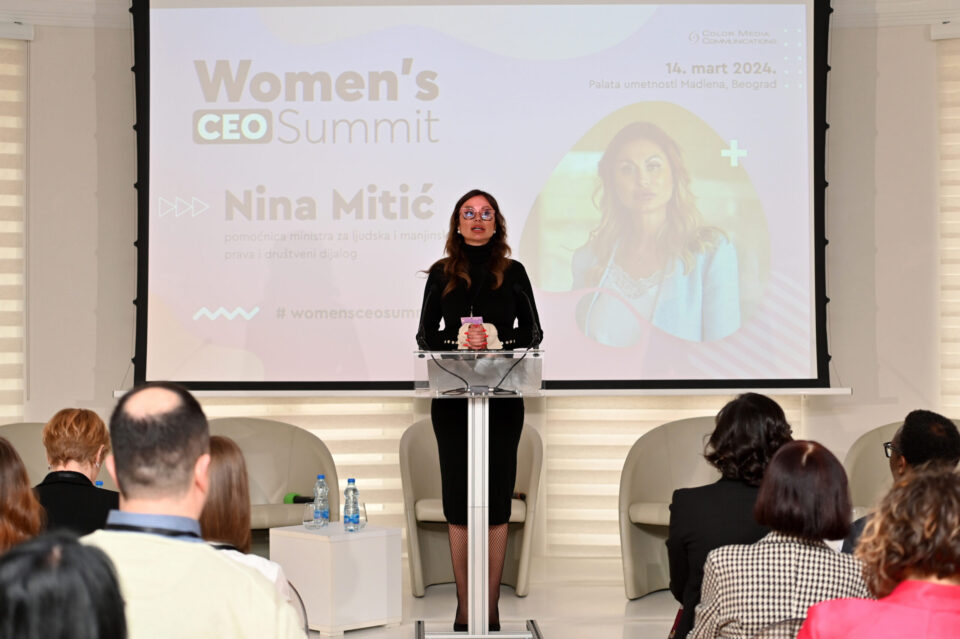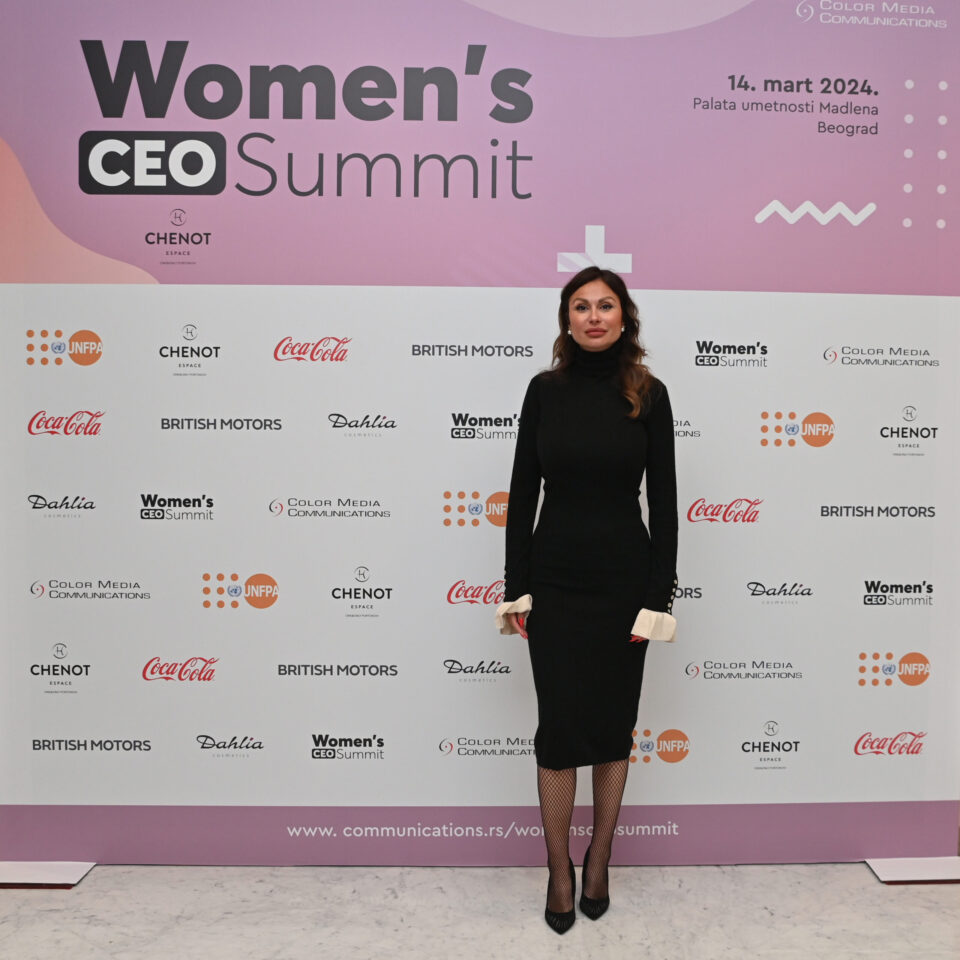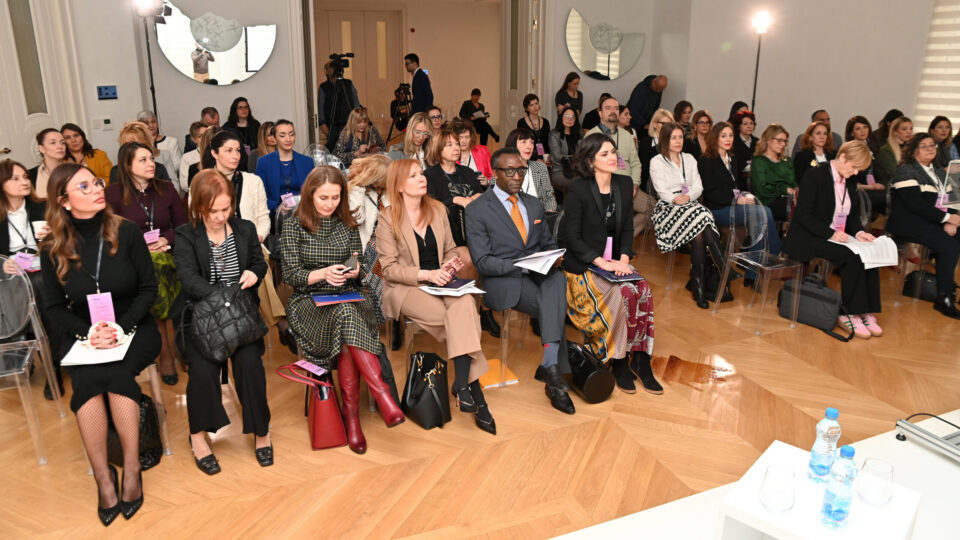Women and girls make up about half of the world’s total population and have a huge potential on which the world rests At the Women’s CEO Summit conference organized by Color Media Communications, held on March 14, 2024, at the Madlena Art Palace in Belgrade, we had the opportunity to speak with Nina Mitić, Assistant Minister for Human and Minority Rights and Social Dialogue.
At the Women’s CEO Summit conference organized by Color Media Communications, held on March 14, 2024, at the Madlena Art Palace in Belgrade, we had the opportunity to speak with Nina Mitić, Assistant Minister for Human and Minority Rights and Social Dialogue.
No matter how systematically we fight and advocate for better gender equality, some members of society will always oppose it and this phenomenon is not unique to our society. What did the ministry you work for manage to do in that regard in the past period?
The line ministry is responsible for the work of the Department for Anti-Discrimination Policy and Promotion of Gender Equality. Since the Department’s inception, we have prepared several legal, by-law and strategic documents regulating the improvement of human rights. I am primarily referring to the Law on Gender Equality and Amendments to the Law on Prohibition of Discrimination. Also, I would like to underline that during the previous period, the Serbian government, i.e. the Ministry of Economy and the Ministry of Agriculture, implemented a series of incentive measures for the development of female entrepreneurship, as well as facilitated the purchase of apartments for single mothers with children, the registration of rural farms and property for women living in rural areas, etc. Another important point is that the state authorities have been continuously working on improving the position of vulnerable social groups while adhering to the #Leaving No One Behind# principle.
How many obstacles did you encounter during your work when solving this important issue and do you think that in Serbia there is a social agreement regarding gender equality or are there still many obstacles to overcome?
If your work is exposed to the public and you often express views or deal with topics that do not follow the majority’s opinion, this is often a huge challenge for all of us. When we add to that the fact that a woman is doing this work, all the gender-based stereotypes and prejudices that are otherwise present are amplified, including public condemnations and exposure to hate speech. It’s a huge pressure, even though due to the nature of her job, it’s not acceptable for a woman to show this publicly. So everything, unfortunately, comes down to a personal struggle, which must go hand in hand with systemic changes. What I can and want to say to all women is to never give up their dreams and continue fighting, because only together can we democratically “destroy” stereotypes, prejudices and fears that come from women being equal to men.
Serbia is ranked second in terms of the number of women on company boards of directors and first in terms of the share of women among company managers.
What is the position of women in the world and Serbia like today?
We are all aware that the conditions in the world are changing on a global level, which, as they affect all of humanity, also affect the position of women. A new report by the World Economic Forum estimates that women won’t be treated equal to men for another 131 years and the global trend of improving the position of women has, according to all reports, slowed down. Unfortunately, this trend did not bypass the Republic of Serbia, which according to the 2021 World Economic Forum’s report on gender equality, dropped from 19th to 23rd place. It is ranked best when it comes to the participation of women in political life, where it ranks 21st. However, if we look at women’s involvement in economic life and the economic opportunities they have, our country dropped from 54th to 77th place in the world. While progress has been noted in women’s access to education, in that respect Serbia ranks 37th place, in healthcare provisions and life expectancy, it ranks 71st in the world.
 Is there something that Serbia could be proud of and something that sets us apart from other European countries in a positive sense?
Is there something that Serbia could be proud of and something that sets us apart from other European countries in a positive sense?
Considering the topic of the conference in which I am participating, I would especially like to point out a positive example. According to the EU-27 Index, which includes the Western Balkan countries, Serbia is ranked second in terms of the number of women on company boards of directors and first in terms of the share of women among company managers.
How about negative and unfavourable things? Have you identified the key problems of gender equality in our country?
According to the 2024 report of the State Statistics Office, only 13.3% of women are presidents of municipalities or city mayors and 37% of women are councillors in the assemblies of municipalities and cities. The data further show that men in Serbia work almost twice as much as women on paid jobs, both on weekdays and weekends, while on the other hand, women do unpaid work at home and farms longer than men on weekdays and weekends. To mitigate the consequences and monitor that gap, the Ministry of Human and Minority Rights and Social Dialogue adopted the Rulebook on the Methodology for the Calculation of Unpaid Domestic Work, which came into force on March 15, 2024. I would like to also note that Serbia is the first country in the world to have this rulebook, and the Ministry for Human and Minority Rights and Social Dialogue will continue to be committed to improving the rights of women and men who are in the same or a similar position in the coming period. Also, I would like to mention that according to the summary 2022 Report on the gender equality achievements in the Republic of Serbia, written by our Ministry, the gender pay gap was 14.4% in favour of men.
 What is the message of gender equality and why is it important for every society?
What is the message of gender equality and why is it important for every society?
Gender equality should be a way of life and work in all areas of social development, especially in the areas highlighted in the Law on Gender Equality. We should be especially mindful of this when appointing persons to the highest government positions, in autonomous provinces and locally, but also when it comes to appointing directors in public companies or members of supervisory and managing boards which have very few female members. The gender perspective should be taken into account especially when it comes to the best-paid positions in society because we need to reduce the gender pay gap.
Efforts to achieve gender equality in all areas are extremely important, given that women and girls make up about half of the world’s total population and have a huge potential on which the world rests. I’ll quote GD Anderson: “Feminism isn’t about making women stronger; women are already strong. It’s about changing the way the world perceives that strength”.
Gender equality should be a way of life and work in all areas of social development.
Although we have left this question for last, we consider it perhaps the most important in your field of work. How can we deal with the terrible phenomenon of femicide, which, unfortunately, has gained a lot of momentum in our country? Since the beginning of this year alone, there have been four cases of femicide. How can we fight against it?
As members of the Operational Team of the Council for Suppression of Domestic Violence of the Government of the Republic of Serbia, the Ministry of Human and Minority Rights and Social Dialogue initiated the collection of femicide-related data and their publication by the Interior Ministry at a meeting held in 2023, because homicide detectives have the possibility of keeping such records. As the Law on the Prevention of Domestic Violence applies only to family relationships and the Criminal Code does not cover the criminal offence that is femicide, our ministry pointed out on the occasion that Serbia passed the Law on the Ratification of the Council of Europe Convention on preventing and combating violence against women and domestic violence (the so-called Istanbul Convention), which, among other things, obliges the signatory states to implement the necessary legislative or other measures to promote and protect the right of every person, especially women, to live free from violence in both the public and private spheres.
The Ministry for Human and Minority Rights and Social Dialogue believes that it is necessary to improve the legal framework, make sentences stricter and expedite the administrative procedure in cases of gender-based violence, and to this end, will advocate that femicide be introduced as a separate criminal offence in The Criminal Code, in addition to forming a public register of abusers, which would include paedophiles, rapists and other sex offenders.
